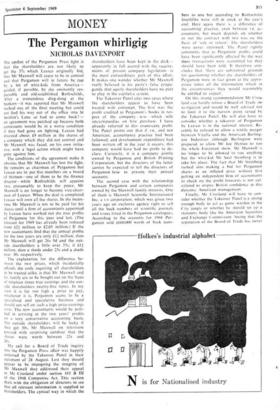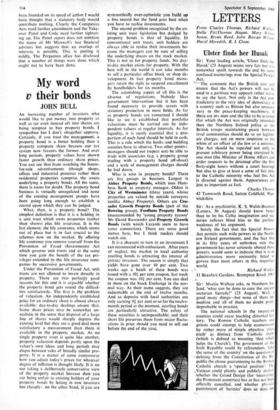MONEY The Pergamon whirligig
NICHOLAS DAVENPORT
The upshot of the Pergamon Press fight is that the shareholders are not likely to get the 37s which Leasco originally bid, that Mr Maxwell will cease to be in control and that Pergamon will in future be ,rup
by a lot of whiz-kids from America—
guided, if possible, by the eminently res- pectable and old-established Rothschilds.
After a tremendous ding-dong at the bankers—it was reported that Mr Maxwell walked out of the final meeting but could not find his way out of the office into, St Swithin's Lane so had to come back!— an agreement was patched up because both contestants would be in a worse condition if they had gone on fighting. Leasco had invested about £9 million in the shares of a company which they did not control and Mr Maxwell was faced, on his own initia- tive, with a legal action which might have gone against him.
The conditions of the agreement make it obvious that Mr Maxwell has lost the fight.
He remains as chairman of Pergamon but Leasco are to put five members on a board of thirteen—one of them to be the finance director—while Rothschilds will appoint two, presumably to keep the peace. Mr Maxwell is no longer to become vice-chair- man of Leasco. When the deal is completed Leasco will own all the shares. In the mean- time Mr Maxwell is not to be paid for.his shares until a firm of accountants appointed by Leasco have worked out the true profits of Pergamon for this year and last. (The forecast for 1969 has already been reduced from £2-k million to £2.05 million.) If the new accountants find that the annual profits for the two years are only fli million, then Mr Maxwell will get 26s 9d and the out- side shareholders a little over 35s; if flf million, then a shade under 23s and a shade over 30s respectively.
The explanation for the difference be- tween the two prices, which incidentally offends the code requiring all shareholders to be treated alike, is that Mr Maxwell and his family are to be bought out on the basis of nineteen times true earnings and the out- side shareholders twenty-five times. In my view it is far too high a price to pay, whichever it is. Pergamon seems to be a specialised and speculative business and should not sell on such a high price-earnings
ratio. The new accountants would be justi-
fied in arriving at the two years' profits on a very conservative accounting basis. The outside shareholders will be lucky if they get 30s. Mr Maxwell on television guessed with surprising candour that the shares were worth between 25s and 28s.
My call for a Board of Trade inquiry into the Pergamon Press affair was happily endorsed by the Takeover Panel in their statement of 28 August. Lest they should appear to be impugning the integrity of
Mr Maxwell they addressed their appeal to Mr Crosland under section 165 B III of the 1948 Companies Act. This section deals with the obligation of directors to see that all relevant information is supplied to shareholders. The cynical way in which the
shareholders have been kept in the dark— apparently in full accord with the require- ments of present company legislation—is the most extraordinary part of this affair. It makes one wonder whether Mr Maxwell really believed in his party's false propa- ganda that equity shareholders have no part to play in the capitalist system.
The Takeover Panel cites two cases where the shareholders appear to have been treated with contempt. The first was the profit credited to Pergamon's books in res- pect of the company—n_sc.—which sells encyclopaedias on hire purchase. I have already referred to this evanescent profit. The Panel points out that if UK. and not American, accountancy practice had been followed, and development expenditure had been written off in the year it occurs, this company would have had no profit to de- clare. Curiously, it is a company jointly owned by Pergamon and British Printing Corporation, but the directors of the latter cannot be expected to tell the directors of Pergamon how to present their annual accounts.
The second case with the relationship between Pergamon and certain companies owned by the Maxwell family interests. One of them is Maxwell Scientific International Inc, a us corporation, which was given two years ago an exclusive agency right to sell all the back numbers of scientific journals and issues listed in the Pergamon catalogues. According to the accounts for 1968 Per- gamon sold £660,000 worth of back num-
bers to Nisi but according to Rothschilds fourfifths were still in stock at the year's end. Here again there is a difference of
accounting practice, even between u ac- countants, but much depends on whether
or not the contract with mst was on the basis of 'sale or return'. The shareholders were never informed. The Panel rightly comments that as Pergamon profits could have been significantly affected by the way tbese transactions were accounted for they should have been told. It therefore con- cludes that 'there are substantial grounds for questioning whether the shareholders of Pergamon were in fact given at the appro- priate times all the information which in the circumstances they would reasonably be entitled to expect'.
On this strong recommendation Mr Cros- land can hardly refuse a Board of Trade in- vestigation and would he well advised not to limit it to the narrow point raised by the Takeover Panel. He will also have to consider whether a takeover of Pergamon by Leasco is in the national interest. Re- cently he refused to allow a textile merger between Viyella and the American Burling- ton Industries although Burlington were prepared to allow Mr Joe Hyman to run the whole European show. Mr Maxwell is no longer to be allowed to run anything but the whiz-kid Mr Saul Steinberg is to take his place. The fact that Mr Steinberg rushed into making a hid for Pergamon shares at an inflated price without first getting an independent firm of accountants to check on the profit forecasts is not cal- culated to inspire British confidence in this dynamic American management.
Finally. Mr Crosland will have to con- sider whether the Takeover Panel is a strong enough body to act as game warden in the City jungle or whether he should set up a statutory body like the American Securities and Exchange Commission. Seeing that the reputation of the Board of Trade has never
ffolkes's industrial alphabet
Nis for Nationalised industry
been founded on its speed of action I would have thought that a statutory body would contribute nothing. Clearly the Companies Acts need further amendment and the Take- over Panel and Code need further tighten- ing up. The Panel report does not mehtion the name of Mr Maxwell's late financial advisers but suggests that an overlap of interests is possible. This is putting it mildly. The Pergamon affair has disclosed that a number of things were done which ought not to have been done.



































 Previous page
Previous page